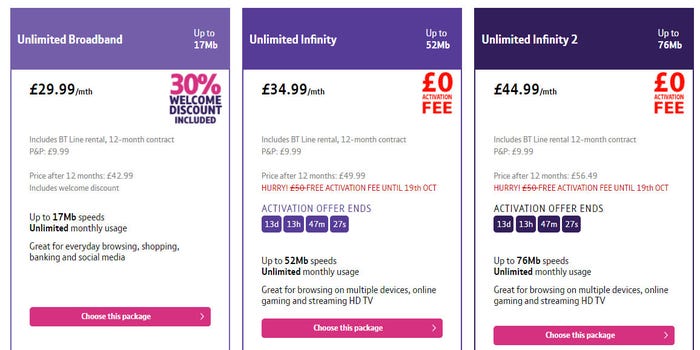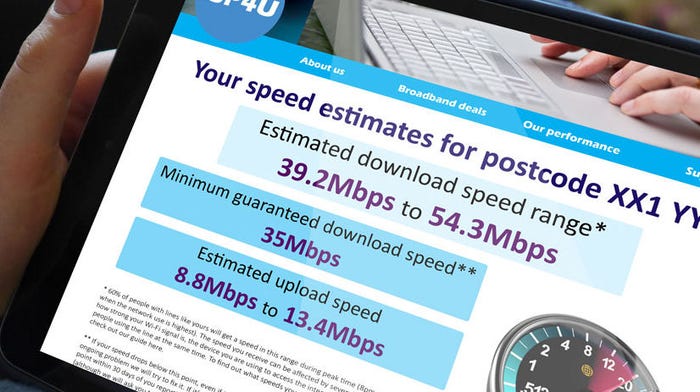Ofcom wants to force broadband providers to stop lyingOfcom wants to force broadband providers to stop lying
The UK telecoms regulator is finally getting around to doing something about dodgy broadband speed claims.
October 6, 2017

The UK telecoms regulator is finally getting around to doing something about dodgy broadband speed claims.
Few other industries can get away with selling their products on the basis of optimistic approximations, as opposed to hard facts, but ISPs have long been an exception. UK consumers typically buy their broadband on the promise that they can expect download speeds of ‘up to’ a certain maximum. In practise, however, the speeds they experience seldom, if ever, come close to that number.
This has long been a source of indignation, not just for consumers but for organisations like the Advertising Standards Authority. The ASA has frequently called out ISPs for taking the piss but the punishment of getting them to amend an advertising campaign that has long since completed is almost entirely useless.
The practise is endemic, as a quick visit to BT’s broadband site reveals. The three packages immediately offered all promote themselves through ‘up to’ speed claims.

Hopefully Ofcom will show itself to have more teeth than the ASA and has weighed into the debate by proposing a range of enhancements to its code of practice, which ISPs that have signed up to it are obliged to follow. Here are the extra powers Ofcom wants UK broadband consumers to have:
Improve speed information at the point of sale and in contracts, by reflecting the slower speeds people can experience at ‘peak’ times; and by ensuring providers always give a minimum guaranteed speed before sale.
Strengthen the right to exit if speeds fall below a guaranteed minimum level. Providers would have a limited time to improve speeds before they must let customers walk away penalty-free. For the first time, this right to exit would also apply to contracts that include phone and pay-TV services bought with broadband.
Increase the number of customers who benefit from the codes, by expanding their scope to apply to all broadband technologies.
So instead of (or more likely as well as) a theoretical maximum, ISPs have to offer a guaranteed minimum speed in their sales and marketing collateral. Hopefully there will be proper punishments for consistently failing to achieve these too, but at least they will provide consumers with an easy pretext to switch without fear of recrimination.
“We want broadband shoppers to know what they’re buying, and what speeds to expect,” said Lindsey Fussell, Ofcom’s Consumer Group Director. “So we plan to close the gap between what’s advertised and what’s delivered, giving customers a fuller picture before they commit to a contract. We’re also making it easier to walk away from a contract, without penalty, when companies fail to provide the speeds they promise.”
Here’s what Ofcom would like ISP collateral to look like from now on.

Plenty of other people have had stuff to say on this. “By emphasising the slowest speed a customer is likely to get at peak times, speed numbers are likely to more closely match user experience,” said Dan Howdle of cable.co.uk. “Whether or not this benefits the majority of consumers who are, by and large, unaware of how these numbers apply to day-to-day usage is questionable, however.
“New rules on broadband speed advertising would have to be coupled with guidelines to ensure customers are informed as to how the speeds apply to the broadband usage of their household, otherwise it’s just a case of swapping one meaningless number for another.”
“Giving more information on what speeds consumers can expect can be a useful move but burying this more detailed information in each provider’s sales journey will only go so far,” said Richard Neudegg of uSwitch.com. “What we need to see – and what we have been calling for – is for this information to be opened up so that consumers can compare different provider speeds side by side at the point of comparison.”
“The minimum guaranteed speed is currently shown by a number of providers at the time of a sale, but with some it is currently hard to find,” said Andrew Ferguson of thinkbroadband.com. “Making guaranteed speeds more prominent across all providers is an important step, but it needs highlighting that the guaranteed speed referred to is usually the connection speed to the router the provider supplies.
“The difference between the connection speed and a speed test on a perfect computer set-up will usually only be 4 to 10% lower (varies due to technology) but for those connecting at the fastest speeds this becomes visible. For example, a Gigabit connection will have a maximum speed test of 940 to 945 Mbps.”
As ever with Ofcom initiatives, this has to go through a process of public consultation before it becomes a thing and you can get involved here if you want. This feels like a good example of where regulation is a good thing. UK broadband consumers are currently being given dodgy information at the point of purchase and making everyone abide by stronger rules of transparency has no competitive or bureaucratic downside to ISPs. Let’s hope this goes through.
About the Author
You May Also Like










.png?width=300&auto=webp&quality=80&disable=upscale)


_1.jpg?width=300&auto=webp&quality=80&disable=upscale)